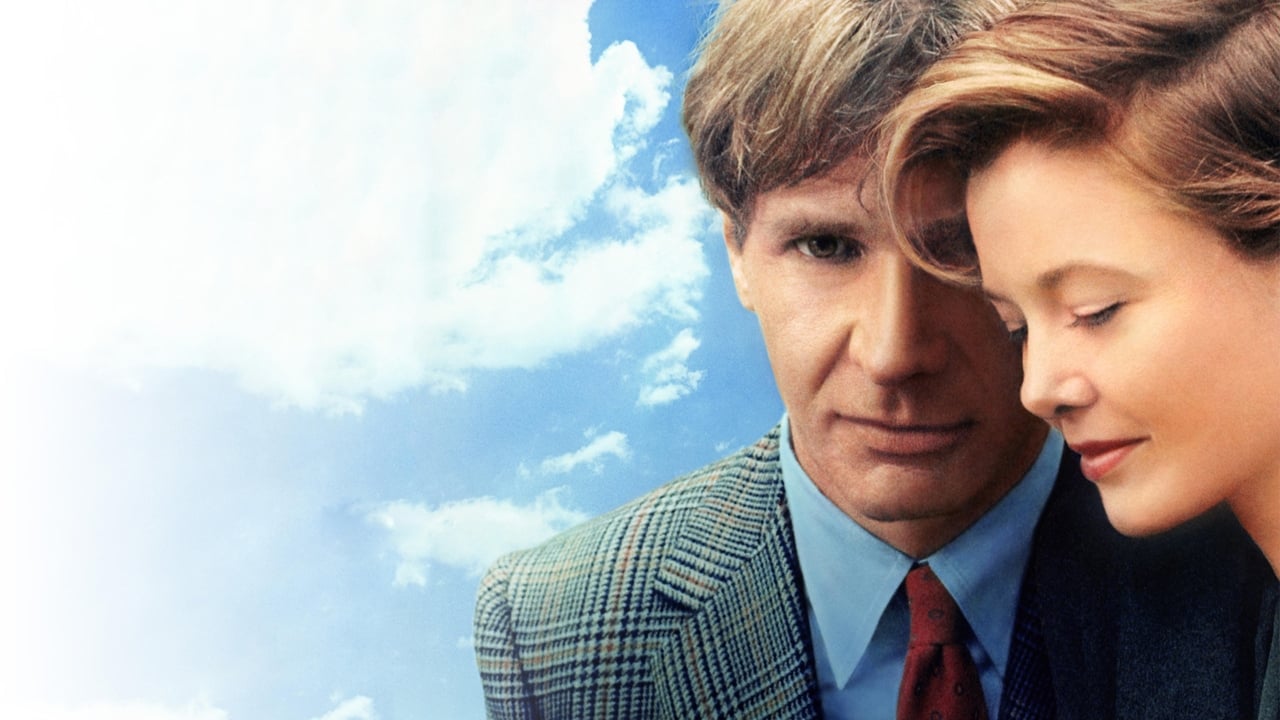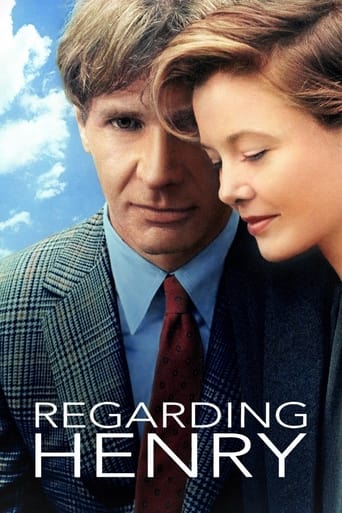

I like movies that are aware of what they are selling... without [any] greater aspirations than to make people laugh and that's it.
... View MoreWhile it doesn't offer any answers, it both thrills and makes you think.
... View MoreThe joyful confection is coated in a sparkly gloss, bright enough to gleam from the darkest, most cynical corners.
... View MoreAmazing worth wacthing. So good. Biased but well made with many good points.
... View MoreIn the 1980s, you were pretty much guaranteed that any film with Harrison Ford's name above the title would be really good. That began to change as the 1990s wore on and in hindsight, this is where the slide began.In theory this could have been an interesting movie. The redemption of a successful but unpleasant human being and the effect his behaviour had on the people around him. Yet somehow, despite the best efforts of everyone involved, it never becomes anything more than a made for TV disease of the week special. Albeit with an expensive cast. It's a real shame that the one time they paired up Harrison Ford and Annette Bening, it was in this!The cast themselves are fine and they all do their best with the material that they've been given. But crikey, the script is just so shallow and facile. It wasn't something I paid a lot of attention to when I first watched this as a teenager. But re-watching as an adult it's most unsatisfactory. Even though being married to evil Henry can't have been easy for his wife, the new Henry's a mixed blessing for her .Yes he's a much more pleasant human being than his old self but she's now left with a diminished, childlike husband for the rest of their days. Adjusting to that's not something that'll happen overnight. The film's also filled with contrived scenes. Henry's Ritz crackers, his miraculous learning how to read and the way he undoes the harm he'd done to the couple at the start of the film. It's all far too neat and tied up in a bundle for my liking. It begs more questions than it answers really.For what it is, it's well made. Ultimately though, it's the movie equivalent of a cheeseburger. It'll fill you at the time but leave you unsatisfied.
... View MoreRegarding HenryWho needs memories when we have thousands of photographs of every event in our lives stored on our computers?Still, the memory loss suffer in this drama would like to regain his recall.Forgetting his cold-heartedness after being shot in the head during a convenient store robbery, high-powered attorney Henry (Harrison Ford) finds himself relying on his neglected wife (Annette Bening) and distant daughter for the first-time in his selfish life.Initially unaware of his former foulness, Henry forges new relationships with both women.When his past becomes clearer, however, he starts to see the flaws in his former existence and sets out to right them. Handcrafted to evoke feels of sentimentality, this J.J. Abrams scripted redemption tale relies too heavily on feel-good father-daughter moments and Dickensian epiphanies to progress its engaging but predictable narrative.Incidentally, the best person to jog an amnesiac's memory is someone who owes them money.Yellow Lightvidiotreviews.blogspot.ca
... View MoreBeing a hardcore Harrison Ford fan I thought this would be - at least - an entertaining movie. Harrison Ford is never in a bad movie, right? Sadly, no. Wrong.The main issue I have with this show is the believability factor. There is none. Why would a cold-blooded, mercenary law firm keep Henry on the payroll at all? He's obviously never going to be a mover and shaker again, as he once was. Why don't they just give him a nice severance package and move on? And how come Henry - who's been seriously brain-damaged - can figure out that his firm cheated on folks? Why would his wife keep old love letters from a long dead affair? Where did their money come from to keep on with their lavish lifestyle? And where was that money going to come from after Henry quit the law? And how did Henry recover so quickly - learning to read in a matter of a few minutes? It's all just a feel-good, chick-flick, fairytale for adults.I expected much more from such a talented cast and crew...
... View MoreHenry is a partner in a law firm. He is arrogant, ruthless, and demanding, as unpleasant at work as he is at home. Then he gets shot in the head during a holdup, and after a little therapy, becomes a really sweet, loving family man who realizes that when he was a lawyer he did things that were wrong.This is probably not very realistic. My guess would be that if brain damage caused a personality change, it would more likely be for the worse. But stranger things have happened, so I suppose the combination of a bullet in the head and lack of oxygen could destroy the part of the brain that makes a man a jerk. The question is, regardless of how likely or unlikely such an event may be, why pick this particular scenario to base a movie on?The head and the heart are the two major components of a man's personality, and the question that has occurred to people over the years is, which of the two is more important? Of course, it is not as though intelligence and a pleasant disposition are mutually exclusive, and that if you have one, you cannot have the other. There are doubtless many geniuses that are kind and loving, just as there are simpletons that are mean and cruel. But if you did have to choose, which of the two would you want more of?Movies often say that the heart is more important than the head. In "A Chump at Oxford" (1940), Stan Laurel and Oliver Hardy find themselves at Oxford, where a bump on the head restores the intellect and character of the man Stan used to be, Lord Paddington, brilliant scholar and athlete. He is also arrogant and condescending, treating Ollie with contempt. Another bump on the head, however, turns Stan back into the good-natured simpleton that we are familiar with, much to Ollie's delight. A couple of other movies that champion the heart over the head are "Harvey" (1950) and "Forest Gump" (1994).On the other hand, if a man is a genius, a certain amount of unlikable personality traits will be tolerated. Sherlock Holmes, for instance, is often portrayed as austere and aloof. In "Flight of the Phoenix" (1965), Dorfmann (Hardy Kruger) does not suffer fools gladly, but we suffer him gladly because he is so brilliant. And the eponymous character in the television show "House" (2004-2012) is often shown to be rude and obnoxious, but all is forgiven because we thrill at watching a superior intellect at work. Furthermore, we vicariously enjoy the arrogance of these characters, since we ourselves often chafe at having to be so darn humble and polite.Needless to say, "Regarding Henry" comes down on the side of the heart. But as I said, I don't think it is very realistic. A more likely outcome would be that a man like Henry would still be the same obnoxious person he was before, only less able to express himself.This is not helped by the fact that the matter of their finances is never really addressed. Henry's daughter Rachel asks her mother Sarah if they are going to be poor, for which Sarah has no good answer. The advice she gets from a friend is not to tell anyone about the dire nature of their finances, but to go out with some friends and spend lots of money, as if keeping up appearances is the solution to Sarah's problems. Sarah does have a job, they do find a less expensive place to live, and they eventually pull Rachel out of the private school, although that is more for emotional reasons than financial ones. In short, we do not have enough specifics to draw any definite conclusions about their finances, but I would have expected more drastic cutbacks in expenditures than that. So, when Henry resigns from his law firm, the sense of financial doom still seems to be hanging over them.The point is that our credulity is already strained by the premise that an obnoxious man would be transformed by brain damage into a wonderful person. The additional unreality of their finances pushes our ability to suspend disbelief just a bit too far.
... View More